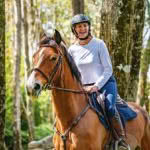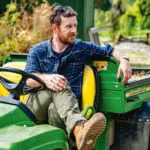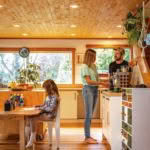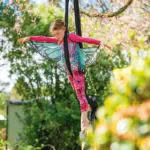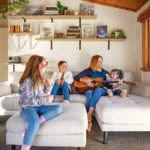An American and a Scotsman make a home in their slice of Tasman paradise
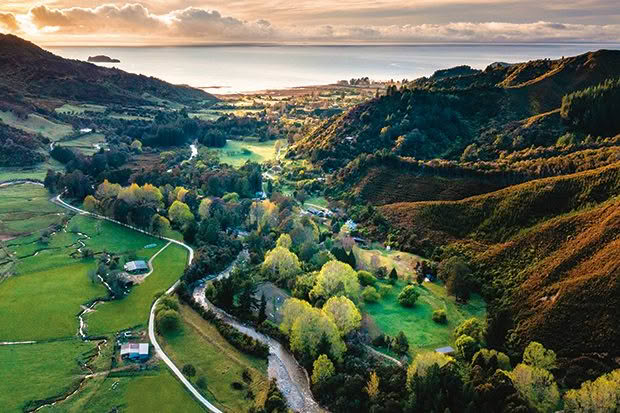
Brittany was drawn to this patch of farmland in her early 20s and wouldn’t let the former owner sell it without staking her claim. “I wasn’t quite sure what I’d do with it long term, but I knew it was somehow inextricably linked with my future in Mārahau.”
A picturesque patch of land in the Tasman region near Nelson grows in beauty and usefulness thanks to two expat kaitiakitanga.
Words: Sarah Templeton Photos: Daniel Allen
Checking on the overnight growth of young saplings is enough to motivate a diehard dendrophile to spring out of bed. But what catapulted Tim Norman out of his Mārahau front door one morning and had him yelling ‘What the hell is that?’ was quite different.
A herd of cows, broken free of a neighbouring property, was trampling the paddock, crushing Tim’s carefully nurtured and recently planted trees.
“They stampeded, and then our cattle broke out to join them. Twenty cattle were crashing about the farm with me running in the middle of them shouting, ‘No, my trees, my trees!’”
Tim, to whom trees are precious, decided he was done with cattle — the neighbours’ and his own.
- Tim, a Scotsman and Brittany, an American expat, fell in love with Mārahau, an hour north of Nelson, when they were young. Their own love story began years later when they had both made homes in Aotearoa.
Pemako Farm, a picturesque chunk of land within a stone’s throw of the Abel Tasman National Park, bordered by the babbling Mārahau River on one side and dense forest on the other, had already undergone various uses under the ownership of Tim and his wife Brittany.
The 10-hectare block is home to the couple and their three daughters — Ella (10), Addie (8) and Sylvia (5) — and is today well suited to its present iteration, with boutique accommodation and a custom-built horse-riding arena.
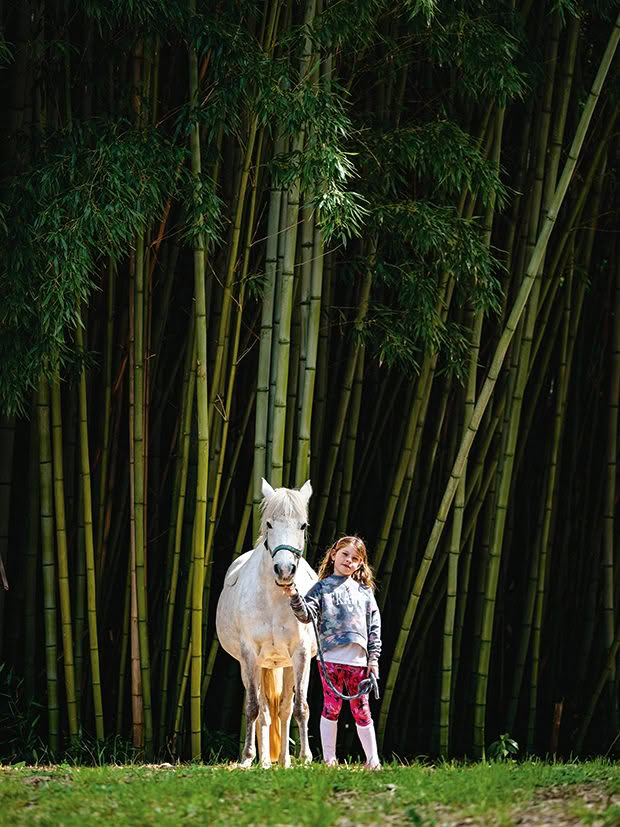
Horses were a big part of Brittany’s childhood. She can now offer the same to her three daughters: here’s Addie with her pony called Blue.
Did Brittany imagine living in such a place when she purchased the land in the early 2000s? After growing up in Texas, her first venture to Aotearoa was inspired by a romantic dalliance with a Kiwi she met while canyoning in Switzerland. She and her father, who traditionally took a “big trip” with each of his children, came on a brief holiday, accompanied by one of Brittany’s school friends. Once Dad flew home, Brittany’s friend steered the pair towards kayaking in the Abel Tasman as she’d seen a television programme about New Zealand’s must-do tourist attractions.
It was just after New Year’s 2003 when the duo set up camp at Old Macdonald’s Holiday Park, which neighbours the farm now home to Brittany and the family. She fell in love with the landscape, returned the following summer to work as a horse trek guide, and eventually, after finishing college in Las Vegas, moved to Mārahau permanently.
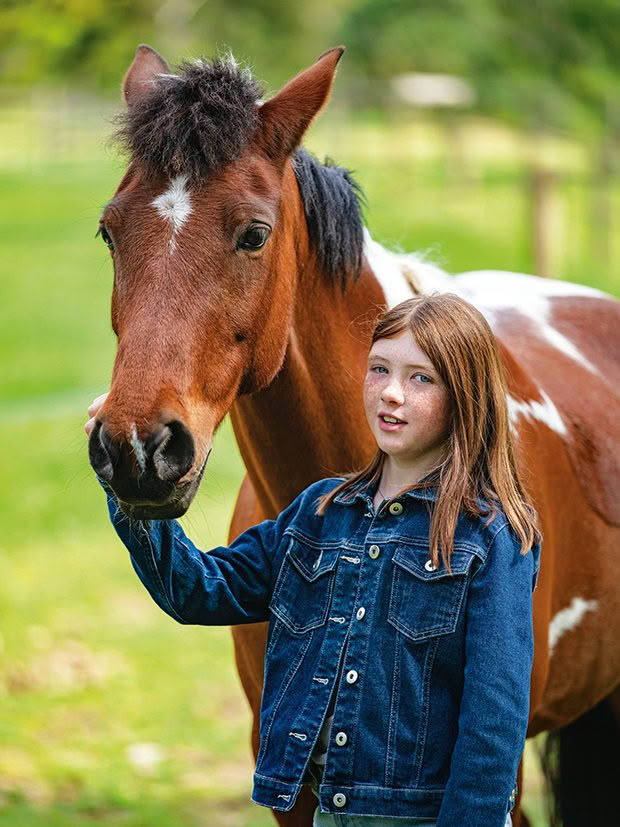
Ella with Roxy.
When she wasn’t working in the nearby Park Café, she liked to visit a friend living in a house bus on a local farm. Learning the owner planned to sell the property, Brittany realised she’d fallen in love with the land. With family support and vague notions of starting a horse-trekking operation, the 23-year-old made a successful offer.
Some six years later, her path crossed with that of yet another immigrant who’d fallen in love with Aotearoa during a holiday in the 1990s.
“I come from Scotland where the weather is crap and thought this is the most amazing place in the world,” says Tim, referencing a dated photograph of a widely smiling, bleached-blond-haired man alongside a kayak on Mārahau Beach. At the time, Tim decided that he wanted to live right there, but it took him more than a decade (and training as an arborist) to get back.
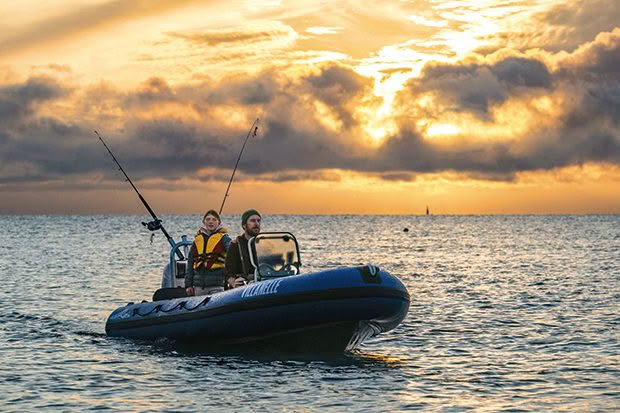
Whether it’s a boat trip to a nearby beach for a picnic lunch, an early morning fishing trip for Tim and Ella, or a ride along the stretch of coastline at low tide, the Normans’ life is marked by the ocean, thanks to their coastal-adjacent catchment.
“One day, 12 years after that first visit, I found myself walking the streets of Nelson with a job as an arborist, unable to believe quite how things had all panned out. Flying over the sparkling coastline on a sunny afternoon felt like returning home.”
An invite to visit “Brit’s place”, as locals knew it, meant passing the beach that had prompted his love affair with the country all those years previously. Brittany was the perfect package deal, complete with picturesque farmland. Tim was all in.
“I’d been an arborist for many years with an affinity with trees,” Tim says. “I recall driving into this place and being completely blown away by the variety of unusual species. It was almost like an arboretum.”
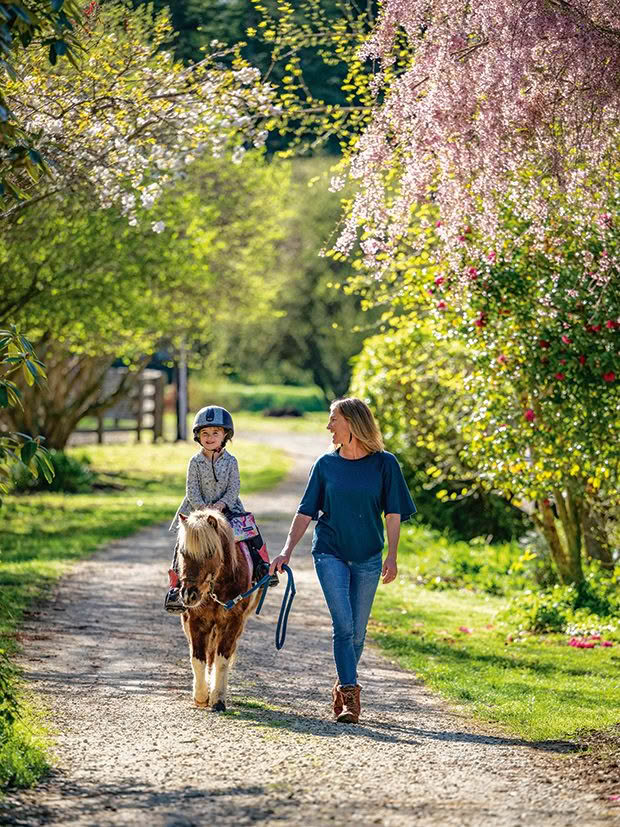
Sylvia with Monty the mini.
The previous owners had let things go, yet Tim could see its potential as something quite special. And extraordinary it has become under Brittany and Tim’s care these past two decades. Now, time is marked by homesteading, guest-hosting and looking after the girls.
But, as they manage the farm’s and the family’s evolution, there’s always a degree of push and pull between their passions. Where Brittany sees spaces for horses to roam, Tim’s tree-honed eyes spy a spot for native planting. However, the future of one area was always set in stone. “A massive field was covered in lumpy gorse bordered by poplars, and the river was, from the second I saw it, the riding arena,” says Brittany.
The arena was completed in November 2021, attracting riders and pony clubs from around the district. Sometimes, Tim commandeers it for frisbee tournaments to keep the balance. But for Brittany, it’s all horses, all the time.
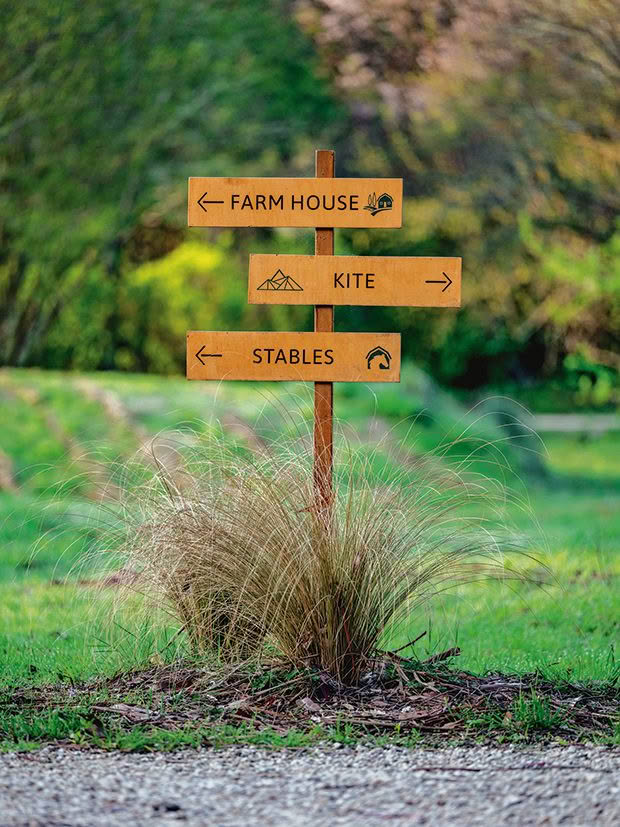
“Through all the phases, horses have been the constant theme,” says Tim. “I had no background with horses, but I’m now used to them. They’ve come and gone — there have been many of them.”
“Well, it takes a long time to get the right horses,” is Brittany’s gentle counter.
Seeing her eldest daughters ride around the ring or take horses down to the local beach recalls Brittany’s childhood with her sister on their similar-sized farm in Texas. While horses may be a constant on Pemako, the same can’t be said for all farm animals. The tree-crushing cows didn’t last long, nor did the pigs and chickens adopted during attempted self-sufficiency.
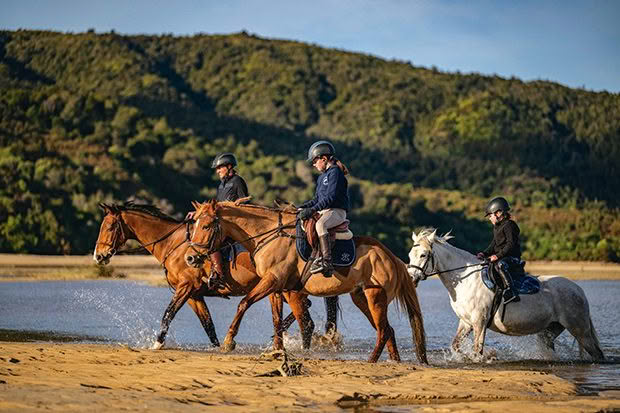
Galloping along the sand on Luchi, Blue and Buddy, Brittany and her daughters have often found themselves the subjects of an unexpected photo shoot by visiting tourists — or by enthusiastic photographer Tim.
“We have lots of happy memories of the kids toddling down to feed chickens. Or the pigs getting loose and us chasing them around the farm, resigning ourselves to never seeing them again and then up the road, the pigs would wander.”
Less happy memories were made with Seamus Finnigan and Mr Darcy, a pair of particularly difficult donkeys who fought for fun. “They were the grumpiest, most belligerent animals you could imagine,” says Tim. The donkeys sealed their fate with a heinous crime committed despite an abundance of grass and hay in their paddock.
“They ate all the bark from a big, beautiful gum. That was it.” The donkeys were sold, and the family agreed they weren’t donkey people.
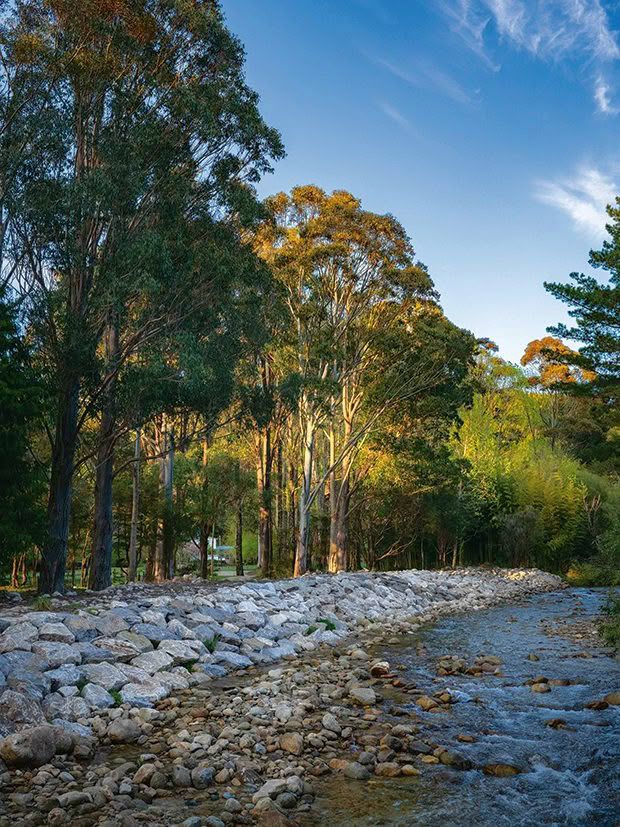
Tim often can’t believe the changes at Pemako when he looks back at photos, even those a year or two old. But there aren’t many opportunities to stop and appreciate what they have achieved, including protecting the small catchment from flooding.
While the donkeys may disagree, Pemako is now known for its hospitality. (A small camp for summer workers Brittany ran during her single years earned the farm the moniker “the Brit-packers”.) The couple opened to paid guests when Ella was nine months old, putting a spare ensuite bedroom on Airbnb — a Mārahau first.
“It was this strange dichotomy of our lives,” says Tim. “We were busy, and we had a lot of work and a new baby, so when guests arrived, we’d say, ‘Right, we’re not going to chitchat. We’ll show them the room and get on with it.’”
Inevitably, conversation would flow and often, a bottle of wine would get opened. “Before we knew it, three hours had passed. People were lovely and had stories from around the world.”
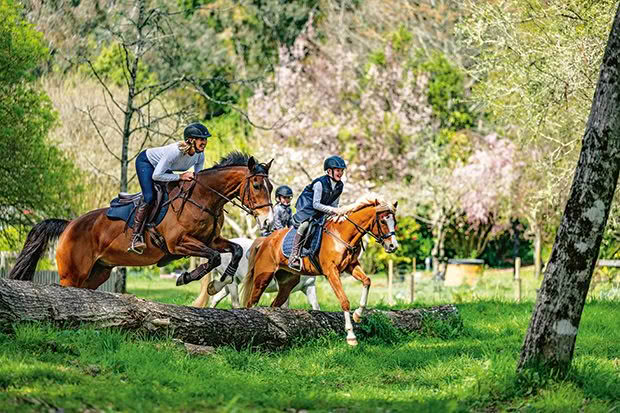
Brittany and her two eldest daughters regularly take their horses to the beach.
When Addie was born two years later, hosting paid guests became more challenging. “One of our very kind reviewers said, ‘Brittany and Tim manage relentless parenting duties while still graciously hosting,’” recalls Brittany. “It was a nice way of saying ‘their kids were really loud’.”
Brittany’s family suggested purpose-built accommodation, which led to the opening of The Kite in 2016. It has the soundtrack of river and birdsong without the noise and intimacy of family life.
- The three girls have recently started at the local primary school — before that, the kitchen table was the site of homeschool lessons.
- Addie (8) shows off her aerial acrobatics among the spring blossoms.
- Family fun includes dedicated music time.
It is another evolution of the farm, which grows alongside the family that loves it. Some changes, such as increasing rainfall, are less welcome and out of their hands. In 2018, Cyclone Gita destroyed a nearby 60-year-old kānuka forest and a beloved river swimming hole.
“Places we’ve loved exploring vanish overnight, never to return, and we try to be okay with accepting the transience of land,” says Tim. “It makes us appreciate the present because you never know what will happen. You can find new swimming holes.”
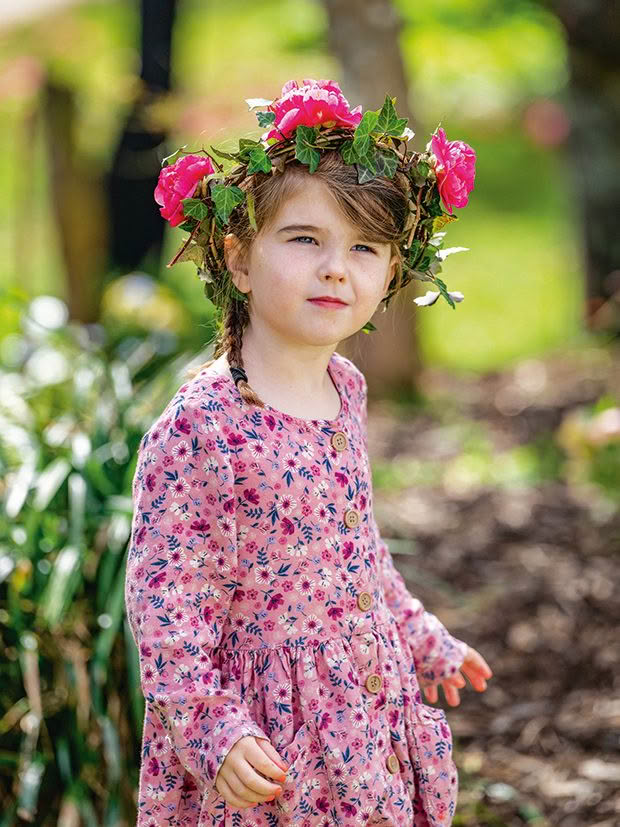
Sylvia (5), the youngest family member, tours her backyard playground of native bush.
But even as the land, family and farm inhabitants change, the beauty of Mārahau is that some things stay the same. “I have a journal entry from my first night at Old Mac’s [holiday park],” says Brittany. “It lists everyone I met at the Park Café that night. And probably 95 per cent of them are still here and drinking beer there.”
ALL IN A NAME
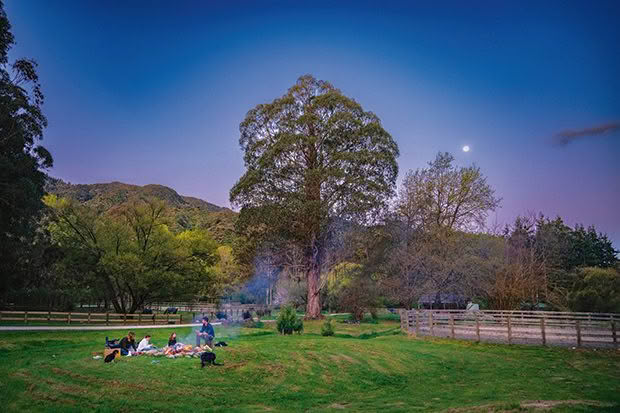
The family enjoys a campfire-lit picnic under the stars near the round pen, jumping arena and a large eucalyptus tree beloved by Tim.
Between 2000 and 2010, Brittany visited Tibet many times. The remote region of Pemako, now known as Mêdog in the county of Nyingchi, inspired the name of her farm.
“I was utterly awed by the place — the most humble, noble, amazing people and its staggering beauty.”
Translating to “valley that opens like a lotus”, the name seemed fitting for this secluded spot in the Mārahau Valley.
“I thought I might start a Tibetan-themed horse trekking business. So, on one of my trips to Tibet, I bought back prayer flags and handmade Tibetan saddle cloths.”
The horse trekking business didn’t eventuate, but village children used the saddle cloths to sit on in later years during community gatherings. “So they were used — just not with horses!”
STAY FOR GOOD
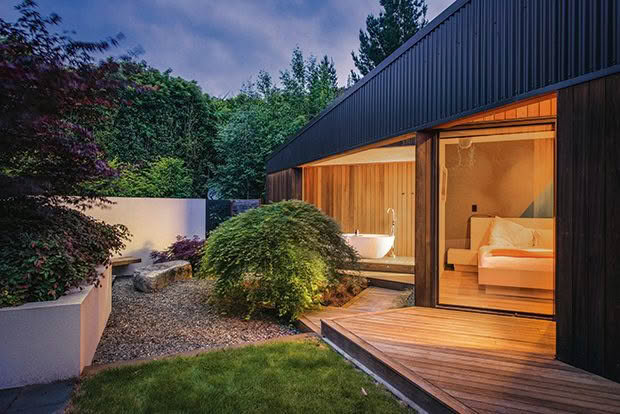
Brittany and Tim’s romantic origins are in altruism. After an initial meeting at the pub, Tim took up a less-than-coincidental position volunteering at the same refugee resettlement centre Brittany worked for in Nelson.
“I got an email after I’d met this attractive Scottish guy at the pub, saying he was interested in the volunteer programme. I thought, ‘Is this the guy?’” Under Brittany’s instruction, Tim did the volunteer course. Very professionally, Brittany waited until the programme had finished before inviting him away with friends for the weekend.
Altruistic motivations continue today; under the Stay for Good programme, a minimum of 10 per cent of profits from The Kite — their accommodation business — goes to charities at home and abroad. They try to keep donations local as much as possible.
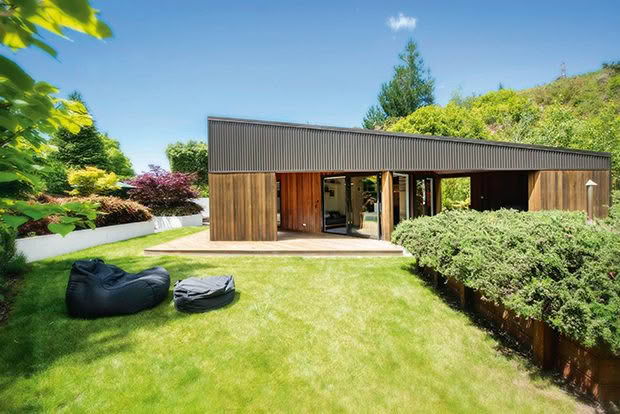
Brittany and Tim opened The Kite in the summer of 2016. It was a team effort, designed by Queenstown-based Kerr-Ritchie Architects and built by Tasman-based friends Chris Butler Builders, with interiors by Living Design. Guests can relax to the soundtrack of river and birdsong from the outdoor bath, verandah swing or custom macrocarpa seat. But behind the scenes, Tim and Brittany will likely be ensuring water tanks are functioning, wasp nests are cleared and horses are safely ensconced in various paddocks.
“One of the reasons we started The Kite is because we’d both been travellers within New Zealand and other parts of the world and had found hospitality. We wanted to give back.”
The intersection of pets and therapy is also a common theme. Recent donations include a pet refuge for the animals of families fleeing domestic violence, a farm in Nelson that uses animal therapy for suicide prevention and an animal hospital in Christchurch.
“We’ve always felt so fortunate to live here as it’s not our home country. We feel grateful to be in New Zealand and to have this piece of land to look after.” thekite.co.nz
Love this story? Subscribe now!
 This article first appeared in NZ Life & Leisure Magazine.
This article first appeared in NZ Life & Leisure Magazine.
